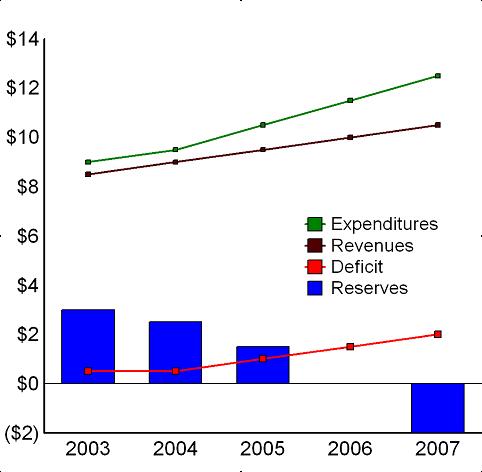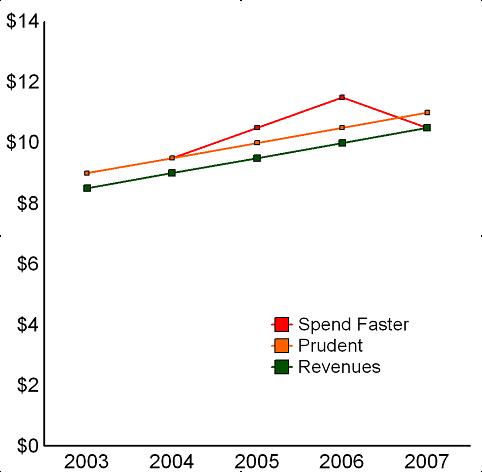Home
Older Topics
Town Meeting
2003 notes
2002 notes
Carreiro's Notes
Arlington Website
My employment resume
Contact me
XML RSS Aggregate
World's Smallest
Political Quiz

It only takes a minute.
Take the Quiz!
Older Topics
Town Meeting
2003 notes
2002 notes
Carreiro's Notes
Arlington Website
My employment resume
Contact me
XML RSS Aggregate
World's Smallest
Political Quiz

It only takes a minute.
Take the Quiz!
Why Spending Reserves is a Bad Idea
While I was writing the letter, I kept getting stuck trying to describe the problem in words. "If only I had pictures . . ." I kept telling myself. Thankfully, I have the web - and it has pictures!
Last year's budget was not truly balanced - Arlington spent more money than it received. We funded our deficit by spending reserves. According to the Finance Committee, next year looks even worse, as does the following year. If we spend our reserves faster than we already have, we're accelerating into a brick wall. We'll hit the wall sooner, and we will hit it even harder.This is the crux of my argument, but it just doesn't have impact without a graph.
If we don't spend our reserves, this is what the town finances might look like. The numbers are fictional, but you see the general idea. 2003 and 2004 (the current fiscal year) are "actual" numbers, and 2005-7 are "future." If you want to scale these to town spending, think of these as tens of millions. (When you're finished reading here, check out the Finance Committee's 2003 Report to Town Meeting, particularly Appendix D, and see what the real numbers are. I think you'll see that my simplified numbers make the point.)

The notable features in this picture are that we are in deficit spending, but at a relatively controlled level. The level of reserves that we have decreases every year. Clearly, it can't go on forever - but it can go on for a little while. To achieve this, we restrain our spending such that it moves in step with our revenues. Our revenue increases come from Proposition 2 1/2 increases to property taxes, new buildings in town, and state aid. Our spending increases will be the usual inflationary presssures, mostly raises and increases in health insurance.
Now, consider what happens if we spend more reserves this year. This doesn't affect our revenue line, but our expenditure line ticks up for the year. To maintain the same level of services, it has to tick up each following year, too!

As you can see, we burn through our reserves much more quickly. Furthermore, it is important to remember that the town can't have deficit spending. In the graph above, I showed a $2 deficit - but that isn't possible. Compare our revenues (which are identical in both scenarios) to our "prudent" spending and our "accelerated" spending. It would really look like this:

As you can see, spending our reserves makes the (fictional) 2007 very painful. Many people find the current financial condition to be painful, but we're actually spending more than we did last year. Think how much harder it would be if we were actually spending less.
There is a potential argument to be made that we should spend now and worry about 2007 when it actually comes. We're only talking about predictions, not sureties. We're in pain now, and we should spend now. The economy is turning around, the argument goes, and our revenues will turn around with it. I think that this may be true, but it is a gamble, and I don't like the odds. The Finance Committee has a good track record at predicting these things (like they predicted the current problems), and they forecast a deficit for at least this long.
Finally, I'm back to the original point of my letter. Spending now is easy. Spending now puts us in a deeper hole than we're in now. The town has cut (or restricted the growth) of some programs. The beneficiaries of those programs want to increase the programs from their current levels. They are suggesting that the way to do this is to spend our reserves. I say that we need to hold the line. This problem will only get worse if we spend more now.
Unfairness, Codified and Perpetuated
Last month, Massachusetts considered making it legal to sell alcohol statewide. The bill failed in the house. The reasons why it failed are almost beyond believing.
The Boston Globe quoted Colleen M. Garry, a Dracut Democrat: "To be frank, it's parochial."
You probably know that it is currently legal to see alcohol in Massachussetts if any part of your town is within 10 miles of New Hampshire or Vermont, who also have Sunday sales. (Of course, that isn't true of towns within 10 miles of New York, but I think you'll find that logic isn't a governing principle here.) Don't forget the holidays, too: It's legal to sell alcohol on Sundays between Thanksgiving and New Year's Day.
Ms. Garry, and her colleagues close to our northern border, simply wants to keep the revenue for herself. If this law had passed, she'd have to share the money with the rest of the state.
That accounts for some of the votes against the change, but not all of them. Finding a copy of the roll call vote online is no easy task, but I finally tracked it down. The House Journal updates every few weeks, and October 8th was recently posted, with the roll call vote(in PDF format). Arlington's Marzilli and Paulsen both voted to keep the current mishmash, while Kaufman did not vote (the record indicates he was out of the country.
Reading the Globe and other papers, it looks like some people voted no because of pressure from Christian churches. It seems obvious to me that they are free to abstain from alcohol on Sundays, but I don't understand why they think it's OK to force
Others voted no because some liquor store owners prefer to have Sunday off. I read the law, and this argument doesn't fly either. They can still have Sunday off. The law would not force them to open their stores. But, the ones that prefer to open will be able to.
Let's review:
- The current law permits Sunday sales in towns that are with 10 miles of New Hampshire and Vermont.
- The current law prohibits Sunday sales in towns that are within 10 miles of New York.
- The current law permits liqour sales state wide in the 5 weeks between Thanksgiving and New Year's Day.
Beyond the clear inequalities of the current law, what about issues of freedom? The government should only prohibit things when there is a clear need to do so, not because it wants to. Where do you draw the line? Cigarettes? Ice cream isn't necessary - close all ice cream parlors on Sunday, let the proprietors have the day off? Malls? Gas stations? If a proprietor wants to sell something, and the buyer wants to buy, the government should get out of the way and let the transaction happen.
Doesn't it seem like change is overdue?